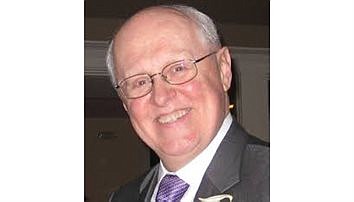January 9, 2019 at 4:27 p.m.
Last month I finally read The Soul of Politics: Beyond the ‘Religious Right’ and the ‘Secular Left,’ by Rev. Jim Wallis. Although the book is more than 20 years old, it has stood the test of time.
Perhaps it was the fact that we were approaching a new year, and the chance that things can change for the better, that caused me to focus on the section “Hope: The Doorway to Change.” I liked it so much that I have decided that “hope” is my resolution for the New Year.
It begins with a story from 1988, when Rev. Wallis and other clergy were in South Africa, responding to a worldwide plea for help from the South African churches that were then fighting to end apartheid. An anti-apartheid rally had been banned by the government, so a church service was quickly called for the same time. Even though police set up roadblocks to keep people from attending, St. George’s Cathedral in Cape Town was packed. As Rev. Wallis described the scene, “All of the human colors waited for the worship service to begin and the Bible to be preached.”
___________________________
‘As we face the issues of the coming year, ranging from the treatment of immigrants and refugees to respect for life, improved healthcare for all, or working conditions for farm workers, we continue to hope. That hope sustains us.’
___________________________
From a distance of more than 30 years, it may be difficult to appreciate how brave those people were and how confident white South Africans were that apartheid would last forever. However, on that night, among those people, Archbishop Desmond Tutu began his sermon by telling the congregants that although the situation might look hopeless, “we must assert, and assert confidently, that God is in charge.”
That is true. God is in charge.
I believe it, and I hope that you do as well.
Bishop Tutu certainly believed it as he addressed the white rulers who enforced the system that separated the races. “You may be powerful, indeed very powerful, but you are not God,” he said. “You are ordinary mortals. God, the God whom we worship, cannot be mocked. You have already lost. We are inviting you to come and join the winning side.”
That is hope. It is a hope based on faith and on knowledge of Scripture.
Rev. Wallis goes on to write, “Between impossibility and possibility, there is a door, the door of hope. And the possibility of history’s transformation lies through that door.”
I know that door exists, because I have walked through it. Most recently, I went through it in the company of everyone who worked on the “Fight for $15” — the effort to raise the minimum wage. When we began the struggle a few years ago, we were told that it was a losing proposition. Today it is the law. It may not be the version of the legislation that we envisioned, but it has improved the lives of countless New Yorkers who now are closer to the goal of receiving a wage that allows them to live in dignity and without public assistance. It succeeded because of the hard work of many people who hoped for a better future.
As we face the issues of the coming year, ranging from the treatment of immigrants and refugees to respect for life, improved healthcare for all, or working conditions for farm workers, we continue to hope. That hope sustains us.
In his second letter to the Thessalonians, St. Paul writes, “You must never grow weary of doing what is right.” (2Thes 3:13) Such advice nourishes us in the struggle to build a better world. It reminds us that God is on our side. It lets us know that while the work is hard, the reward is great. And it promises us that hope it not misplaced if it is based on the Word of God.
Deacon Walter Ayres is director of Catholic Charities’ Commission on Peace and Justice.
- Stay salty (the holy way)
- Catholic immigrant advocates call for humane approach as report finds child ICE detentions up 600%
- Human dignity at center of social justice, development, says Vatican diplomat at UN
- New York archbishop from Joliet is on a mission from God to go make disciples of everyone
- Meloni-look-alike angel removed from Rome church after brief viral moment
- Pope Leo XIV calls for prayers for children with incurable diseases
- Religious sisters’ organization in Ireland has fought human trafficking for 20 years
- In National Prayer Breakfast address, Trump backs Noem after Minneapolis fallout
- Pope warns little progress has been made to protect children worldwide
- Shevchuk: Faith endures as Ukraine’s source of hope as full-scale war marks 4th anniversary








Comments:
You must login to comment.